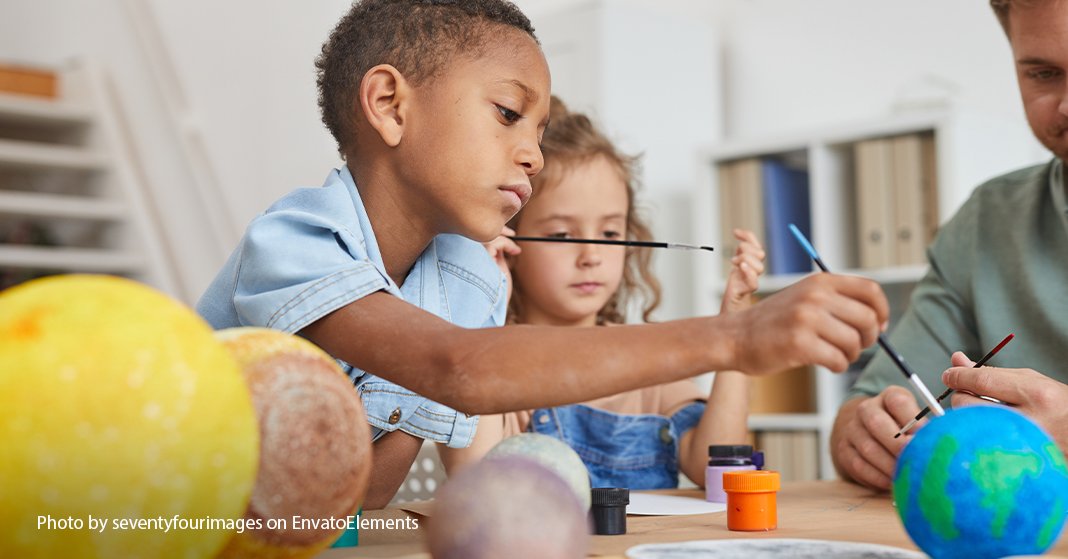
Have you experienced frustration when trying to teach your own children? I can remember sitting at the table with one of my daughters, going over a simple sequence of events in American history, and she just couldn’t get it straight. The thought of “why can’t she learn this simple idea?” quickly led to “I’m such a failure as a homeschooler.” As a homeschool grad and a homeschool dad, I’ve had experience on both sides of this disheartening scenario. Often our frustration grows from our expectations about teaching. If we have a better understanding of teaching as a creative practice, we can also have better expectations for our children.
1. Creative Teaching, Not Task Completion
We too easily think of teaching as a task to complete. We share information, demonstrate skills, give assignments, and grade results. But that’s not all that teaching involves. It’s two or more people meeting together to learn together. There is no magic formula to guarantee your child will learn. Successful teaching requires you to create learning experiences. During creative teaching, there is always the possibility your method won’t work well for your child. That’s why you have to stay with it day after day. Don’t give up. Eventually, you will learn how your child learns best so you can create successful learning experiences.
2. Teaching Is Sacrificial
We teach for the benefit of our children. We don’t just teach because the government or society requires it. We teach because our children need to learn. God calls all people to exercise dominion, and it is our responsibility as parents to prepare our children to care for His creation. So whether you teach your children to farm or to read, you equip them for what God has planned for their lives.
Educating children isn’t easy. It takes dedication and sustained effort for nearly two decades. Today, many parents have willingly handed this responsibility to the government. And they are fine letting the government schools decide what’s important to teach children. But you’ve decided that God’s given you the responsibility to teach your children. That requires sacrifice. Denying yourself daily for your children. But it’s worth it. One day, you may visit your grandchildren and see the skill and wisdom your children have applied from your instruction to care for their own families. You will know the daily practice of teaching your children was worth the sacrifice.
3. Teaching and Learning Aren’t Immediate
Many of us who have lived in a capitalistic society don’t like to wait. When I order food, I want it now. When I make an online purchase, I want it now. Although I’m thankful for the ways that capitalism have driven down the amount of time, I have to wait for items I’ve purchased, that quick turnaround instills an impatience. But this impatience isn’t helpful when it comes to training our children. There are no shortcuts in learning. Of course, there are always tricks for bypassing the learning process to quickly get the right answer, but that isn’t valuable. Instead, mastering math, English language arts, and the other disciplines takes time and investment.
But we often expect our children to absorb the subject matter immediately. We want our children to be introduced to fractions and master them all in one lesson. But that’s unrealistic. Focusing on the learning process releases us from the tyranny of now. It allows us to create a learning experience, receive feedback from our child, and then try again tomorrow. Don’t worry about becoming the perfect teacher in the next fifteen minutes. Relax and let your child have space to grow.
Tips for a Successful Learning Experience
Don’t Give Up
Sometimes we’re not just impatient with the learning process, we are tempted to avoid it altogether. When we know that reading lessons will include a clash of wills and may end in tears, we may consider pushing the lesson off. We’ll get to it tomorrow or the next day. But your mission is too important for that. God created families so your child’s growth is dependent on your instruction. So don’t give up. Go through the activity you have planned, even if the last one didn’t go as expected. And don’t be concerned. Tomorrow, you can try again. You and your child will grow alongside one another because of what you learned through practice today.
Practice Doesn’t Stop
I have found viewing homeschooling as a practice relieves pressure. It removes the pressure of being the master teacher. It relieves me from needing to see results right away. Instead, I can focus on my child and the process of creating learning experiences for her growth. I won’t get it perfect today. Even on days with “lightbulb” moments, I know I can do better because tomorrow I will be teaching again. And that will be practice too.
Acknowledgement: Seth Godin’s book The Practice: Shipping Creative Work. Many ideas from this post come from Seth’s book. If you or your child are interested in creative pursuits, give the book a read. Just know that Seth is not a believer and you will want to read with discernment. He has learned much about God’s creation, but there is much of the fall in his thinking too. So read carefully and respond redemptively.
Leave a Reply